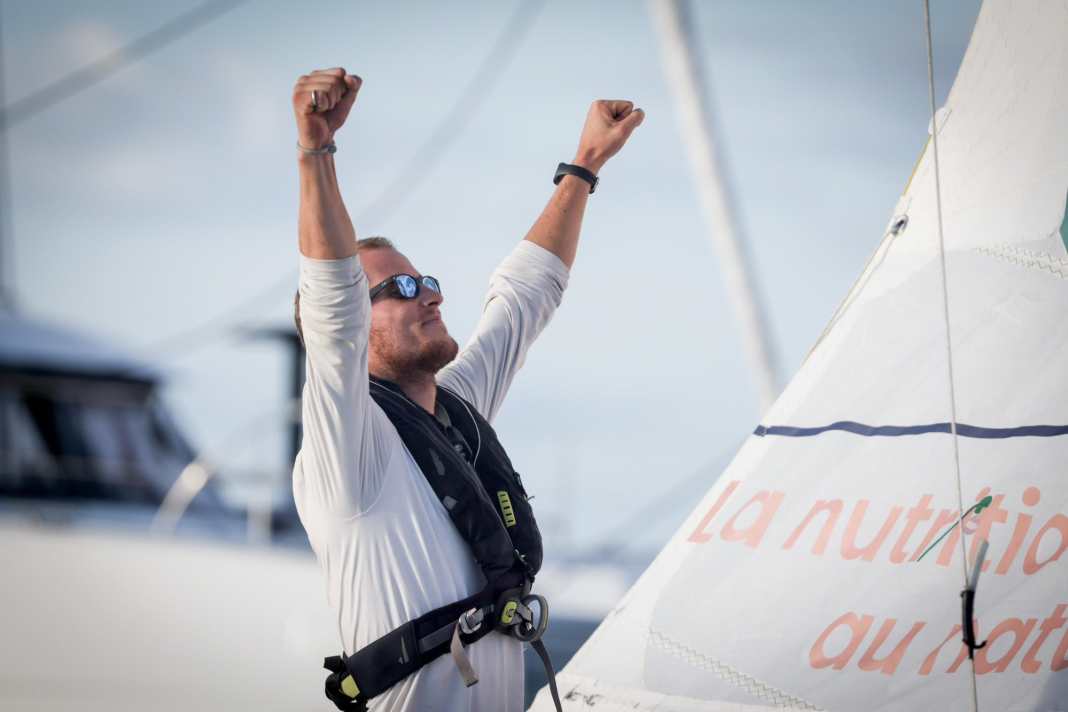Mini-Transat: "All over in two seconds" - David with emergency rig at the finish line
Tatjana Pokorny
· 17.11.2025





Victor David will never forget 6 November. The German-Frenchman, who lives in Paris and had partly prepared for the joint Mini-Transat premiere together with the German Mini soloists Hendrik Lenz and Thiemo Huuk, was in 25th position in the fleet of series boats with his Pogo at 16°N and 43°30W in the middle of the Atlantic. He had gradually worked his way up to this good intermediate position after a weak start. He was just below deck when he was hit first by a sunburst and then a menacing bang in about 25 knots of wind.
Mini-Transat: green soup below deck, then mast breakage
The conditions were unpleasant at around 11 o'clock in the morning. "Above all, the wave was relatively short, so my boat was really constantly thundering into the wave. There was a lot of water coming over the deck and I just had a short rest inside. All hell broke loose there too. My avocados had flown around and mixed with seawater. There was a green soup everywhere and I just had to rest for a while. I was sitting there when suddenly the sun shot. And three seconds later, the big bang..."
What happened? Victor David says: "My first assumption - and I think this is probably the cause - is that the T-profile that anchors the V1 cable, i.e. the main shroud at the top of the mast, has broken. I was riding a sun shot. As a result, there was of course a bit of bounce on the mast. Then the part broke at some point. And then there was nothing holding the side of the mast in place. I was inside when the mast broke, but I didn't see exactly what broke first."
At the finish line, Victor David was convinced that the sun shot was "mainly due to the swell, the short wave". "The autopilot was a bit overwhelmed," says David. Almost three metres of the mast broke off. "It's just a predetermined breaking point with these masts, there above the second spreader. It's often a bit more fragile there. It's a classic spot. I was lucky that it broke there and not lower down. That meant I could still use a bit of mast height, but anything that was a spinnaker or gennaker was no longer possible."
Initially good speed even under emergency rig
Victor David hardly touched his mainsail after the accident. He says: "There was still a lot of surface area on top. When the mast broke, the mainsail wasn't damaged that much, it still looked okay. Over time, however, wear and tear and a few holes appeared in the main. In any case, I still had enough surface area left of the main, especially at the bottom. Which meant I still had quite good speed. That's why I decided to lock it as well as possible so that it wouldn't slip any further."
Victor David did not see the opportunity to go back into the mast under the given conditions after his mast break in the Mini-Transat. "I no longer had a halyard to belay myself with. If I had, I would have climbed up there barefoot and without safety equipment. That was too dangerous for me. I didn't want to cause a second accident. Then I decided to continue with the storm and mainsail for the time being. That worked out quite well."
Victor David shifted the weight of the boat forwards. "As a result, the boat actually got into the surfs quite well. That actually worked quite well in places. I also saw ten or eleven knots of speed in the surfs. But of course I also knew that the wind would weaken at some point. The very next day I was only five knots fast, the day after that it was only three knots. It went down very, very quickly."
Minit-Transat: 48 hours in "off mode"
He had after the mast breakage realised relatively quickly that the sporting element was over, says Victor David in retrospect. Having quickly arrived on deck after the crash, he immediately looked up. His recollection: "That's when the brain first focusses on the things that need to be done: catching everything possible, securing everything. And then I collapsed. It took me 48 hours to get back to 'minimal mode', just to realise what had happened."
It's brutal: it's all over in two seconds. Three years of work ... and the race is over." Victor David
"It was tough. I really locked myself in the boat for the first two days afterwards. I closed everything up. I didn't want to hear anything, I put on noise-cancelling headphones so that I didn't have to listen to the sound of the mast banging. I also covered all the windows and really didn't go out of the boat, I shut myself off."
I couldn't do any more. I didn't want to see the broken mast, so I stayed below deck." Victor David
The background noise was horrible for the soloist. Victor David says: "First of all, there are cables hanging on cables. That rubs against each other and is a very unpleasant noise. Our boats are pure nutshells. And then it echoes a lot. The noise is amplified inside. The mast itself, the broken piece, was hanging from all the halyards that were still going through. Every little wave caused the broken piece of mast to bang against the remaining mast."
Second mast break soloist still at sea
He never felt in danger after the mast break, he just took a few days out of the game. He started listening to music again from day four after the mast break. "For me, music helps enormously to restore my good mood," says Victor David. He also wrote a lot, filling his logbook with the thoughts that were going through his head. "That also helped. Day by day, I realised more and more that the race was over and that I had to accept that," he says many days later in the Mini-Transat finish harbour.
He also realises "that it could have been worse" when he is alone at sea. 56th place was not the result he wanted. But it is a result that seals his completed mini-transat. "I hope it will be enough for Thiemo too," mused Victor David in Saint-François. The mast of "Europe" skipper Thiemo Huuk was broken before his own accident on 3 November. This meant that Huuk had to cover a much longer distance under emergency rigging. Here you can follow its path in the tracking for the mini-transat.
On the morning of 17 November, "Europe" skipper Huuk was the last helmsman in the race with almost 300 nautical miles to go. Victor David now looks back on "two chapters" of the second leg of the mini-transat: "You can also see it that I was lucky that I was able to experience the second chapter. The others didn't have that. And it also had something: having this strange rhythm is also quite interesting. I lost track of time a bit. That was also kind of cool. That's why I didn't want to arrive on the last night."
I'm very happy to have arrived, but of course also a little sad that it's over." Victor David
Instead of finally crossing the finish line in the middle of the night, Victor David spent the night out at sea off Guadeloupe. "I didn't want to arrive yet. I felt really comfortable there at sea and could probably have sailed on for a few more days. When the race is already ruined anyway, you have to make the best of the situation. When all the days were the same, I entered a kind of calm state. You make a bit of peace with yourself. And I loved that," he said in an interview with YACHT online late on Sunday evening.
Lucky timing in the mini-transat final
But when Victor David crossed the finish line the following morning, his arrival exceeded all expectations. "I drove to the finish line in the first sunshine, thinking that everyone was probably still asleep. But then everyone was standing on the jetty. That was an amazing feeling. It felt good - with my whole family. Two friends from Aachen were also there. We went straight to the beach. I was lucky because most of them are leaving again today. Good timing..."

Tatjana Pokorny
Sports reporter

